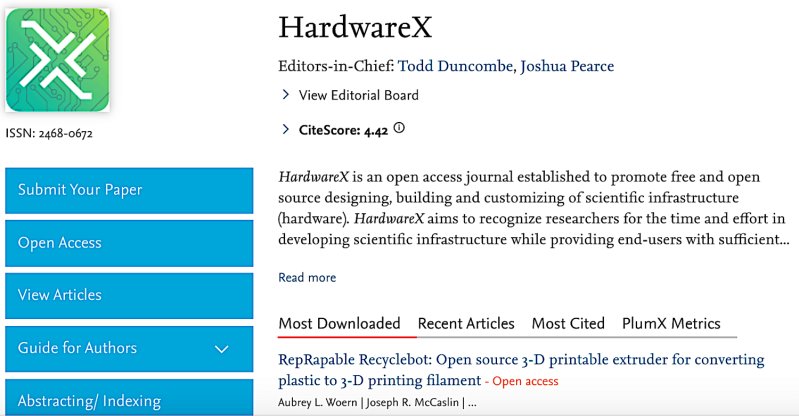After three years of online publications, HardwareX may have solidified itself as an academic journal for open-source hardware. We originally wrote about HardwareX back in 2016. At the time, HardwareX hadn’t even published its first issue and only begun soliciting manuscripts. Now after three years of publishing, six issues as of October 2019 (with the seventh scheduled for April 2020), and an impact factor of 4.33, it’s fair to say that Elsevier’s push into open-access publications is on a path to success.
To give you a bit of background, HardwareX aims to promote the reproducibility of scientific work by giving researchers an avenue to publish all the hardware and software hacks that often get buried in traditional manuscripts. The format of HardwareX articles is a bit different than most academic journals. HardwareX articles look more like project pages similar to Hackaday.io. (Maybe we inspired them a bit? Who knows.)
It’s a bold attempt on Elsevier’s part because although open-access is held as an ideal scenario for scientific work, such efforts often come under quite a bit of scrutiny in the academic community. Don’t ask us. We can’t relate.
Either way, we genuinely wish Elsevier all the best and will keep our eyes on HardwareX. Maybe some of our readers should consider publishing their projects in HardwareX.

















similar to hackaday.io? you mean nearly broken and the content only fills 1/3rd of the right of the screen in a endless stream of text? Super we need more of that …
Now now, somebody had to put a great deal of thought and time into making an interface that was less fluid, less user friendly and less intuitive than merely hammering pages out in raw html in notepad.
Basically this is how it works:
You are a ‘scientist’ and want/need to publish your work. You cannot just put it on a blog or make it otherwise available, because this won’t count towards your ‘peer reviewed’ output (and then you won’t get promoted). To get it ‘peer reviewed’ you must send it to one of the fabulously rich publishing companies. They will then send it to other ‘scientists’ to review it. They pay the other scientists exactly $ 0 for doing this. To get them to then host your paper for others to read, you then pay the publishing company a lot of money. In this case $ 500. You get your ‘peer reviewed’ scientific publication (which must be really fantastic because other scientists said it was) and the publishing company gets the money. Imagine if hackaday.io asked people for $500 to publish their own work, and that is basically what this is.
Would it actually push people to publish good, exhaustive, well-detailed content instead of half-assed articles that nobody needs ? maybe
I’m not a fan of the $500 fee to host the “paper”. I get that the fee keeps the riff-raff out (see Thingiverse for what happens when hosting is free), but $500? Ouch! It probably keeps a lot of quality work out, too.
I’m just gaining experience in the academic publishing realm, but as far as I can tell, a few hundred dollars for the article processing charge (APC) is pretty fair. Other open-access journals have APCs in the thousands. Some journals offer fee waivers to help offset the cost. Some universities and funding agencies are starting to set aside funds solely for the APCs. I think as we move further with open-access, APCs will reduce. On top of all that NIH funded research (and other funding agencies as well) automatically become open-access after a year of original publication, regardless of the journal it was published in. I think the future with regards to open-access science is pretty bright as far as I can tell. We’ll see how long this takes to come to fruition.
Cost may be higher in the long run as publishing rights also have a monetary value.
Read the fine print: “For open access publishing this journal uses an exclusive licensing agreement. Authors will retain copyright alongside scholarly usage rights and Elsevier will be granted publishing and distribution rights.”
Uh, Elsevier – obligatory link to http://thecostofknowledge.com/
I try to avoid them at any cost.